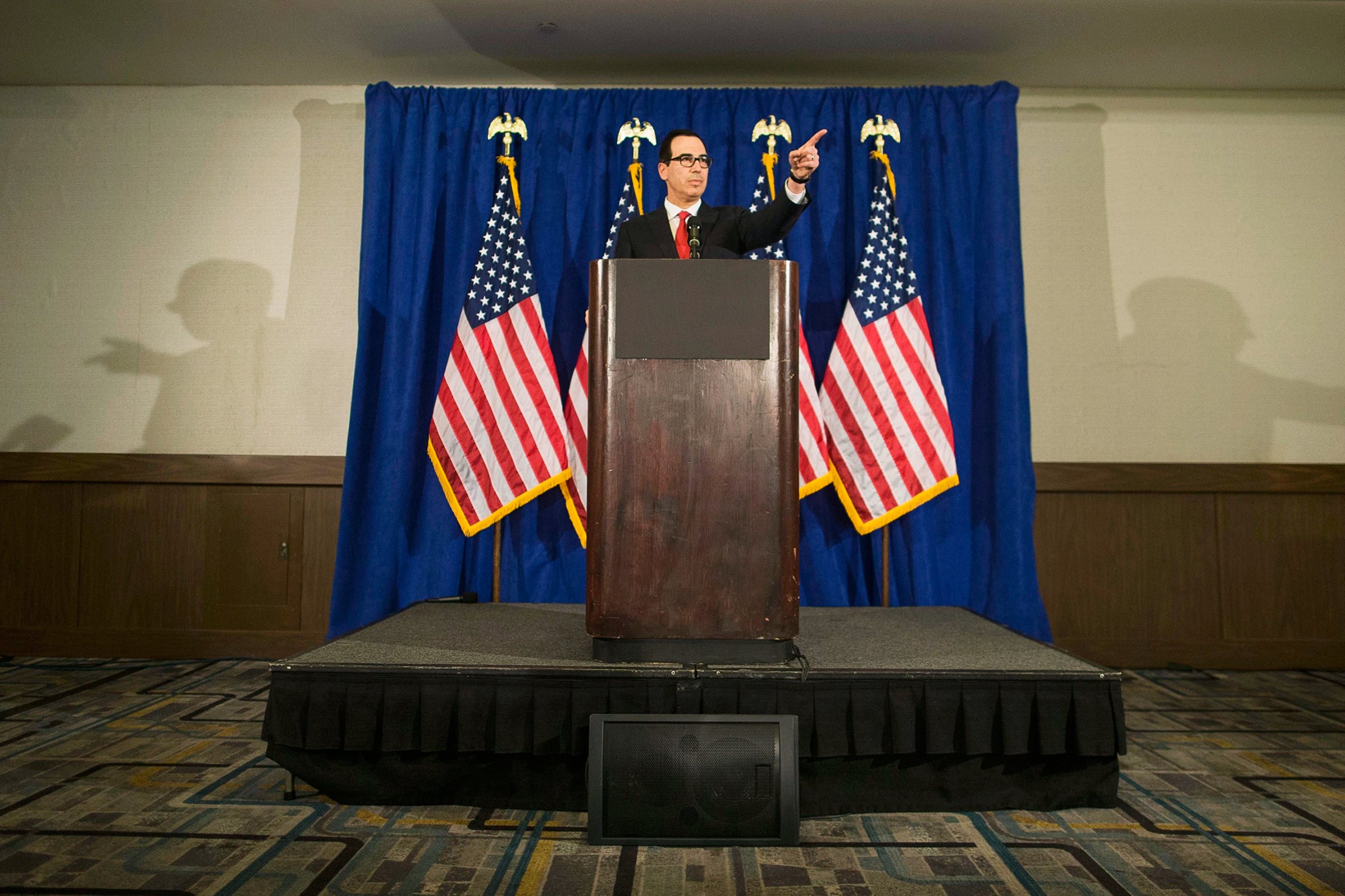
Like a novice waiter facing unruly diners, Steven Mnuchin has spent the past six months trying to entice Washington with what should be an appetizing offering: tax reform. Huddled in closed-door sessions in ornate conference rooms across the capital, the Treasury Secretary has offered options, and taken orders, in a chaotic search for consensus on the Republican Party’s long-sought legislative agenda item. But on Sept. 27, when Mnuchin and congressional Republicans emerged from the kitchen, what they put on the table amounted to a promise of dessert with little sense of when the main course would arrive, let alone what it would consist of.
The tax-reform package Mnuchin and his allies presented would slash corporate tax rates from 36% to 20%, raise the lowest tax bracket from 10% to 12% and increase the number of people who would pay no taxes. But the ultimate shape of the proposal–and its impact on middle- and lower-income Americans–was impossible to determine. The specifics on many deductions and the precise new income brackets are not yet on offer.
Despite the GOP’s outward enthusiasm for the rollout, behind the scenes the concern among Republicans was palpable. Tax reform now represents the last, best hope for big-ticket legislation. Few expect the measure to take shape until early next year as Republicans must again try to reach agreement on what they actually want the big bill to be.
Helping to deliver that package is an improbable role for Mnuchin, a successful Goldman Sachs veteran turned Hollywood producer with a nine-figure net worth. He entered Donald Trump’s orbit in April 2016 as his national finance chairman and then, weeks after Trump’s victory, was nominated for the top spot at Treasury more for his personal ties with the President than his financial background. The job of Treasury Secretary is chiefly to be a Washington horse whisperer to the financial markets, to calm their nerves and guide their moves in accordance with Administration needs. At first things went well. Mnuchin won an early battle with Gary Cohn, a fellow ex-Goldman employee who is the director of the National Economic Council, to become the public face of tax reform. But that proved to be a mixed blessing. In impromptu fashion on April 21, Trump told the Associated Press that Mnuchin would announce details on tax reform the following week. The one-page plan hastily drawn up to meet Trump’s surprise deadline proved to be even more amorphous than his campaign pledges.
Mnuchin’s unforced errors would soon make matters worse. In June, Trump and much of the West Wing and Cabinet attended Mnuchin’s black-tie wedding to Scottish actor Louise Linton. Senior Administration aides in attendance commented on the affair’s opulence for days. That set the stage for increasing allegations by Administration critics and government watchdogs of extravagance. The Treasury Department’s inspector general is reviewing Mnuchin and his wife’s Aug. 21 flight on an Air Force jet to Fort Knox, Ky., where they were photographed watching the total eclipse of the sun. It is also examining Mnuchin’s request, later withdrawn, to use an Air Force plane for his European honeymoon over the summer. (Mnuchin explained that he made the request to ensure that he had secure communications with the White House.)
The job of selling a tax-reform package that would seem to bust open the deficit to provide massive corporate tax breaks isn’t going to get any easier. It hardly resonates with Trump’s populist promises, and while the President went on offense, touting the plan at a rally in Indiana the day it was released, behind the scenes he is adding to the workload. In the days before the plan’s release, Trump raised concerns that some of the provisions–especially the corporate tax cut–didn’t go far enough, according to a White House official. He continued pushing for a 15% corporate tax rate after the so-called big six Republican negotiators had long ago set it aside for 20%.
All of which helps explain why Republicans on the Hill, starving for a legislative win, will soon take control of tax reform themselves through the committee process. Where that leaves Steven Mnuchin is unclear, but at this point, he shouldn’t expect many tips.
More Must-Reads From TIME
- The 100 Most Influential People of 2024
- Coco Gauff Is Playing for Herself Now
- Scenes From Pro-Palestinian Encampments Across U.S. Universities
- 6 Compliments That Land Every Time
- If You're Dating Right Now , You're Brave: Column
- The AI That Could Heal a Divided Internet
- Fallout Is a Brilliant Model for the Future of Video Game Adaptations
- Want Weekly Recs on What to Watch, Read, and More? Sign Up for Worth Your Time
Contact us at letters@time.com